For the 37 people who have been saved by organ transplants from deceased patients in the UAE, the 10 anonymous donors will always be remembered as heroes who in death, gave the gift of life. For the families of the dead, who in the depths of grief somehow found the strength to save other lives, no words of admiration can suffice. The first six donors since the law permitting transplants came into force in March last year gave two kidneys, three livers, four lungs, a pancreas and two hearts. Most movingly of all, the fourth donor was a two-week-old girl whose parents, in a supreme gesture of humanity, donated her kidneys.
Thanks to the efforts of the Ministry of Health and Prevention and the National Transplantation Committee, the UAE's National Programme for Organ Transplantation has moved swiftly since the change in the law. Legal and medical frameworks are in place. Doctors have been trained in partnership with world-class programmes in Spain and Saudi Arabia and the UAE now has four hospitals licensed to perform transplants. But although lives are being saved, one vital component of any successful transplantation programme is still missing – a register of willing donors. Without a register, the transplantation programme relies on asking grieving families for permission to use the organs of loved ones or has to fly in organs from neighbouring countries, a complex logistical process.
The health ministry is developing a register, which will be open to anyone living in the UAE, under which a willingness to donate organs after death will be recorded on an individual's Emirates ID card. An alternative would be an opt-out scheme, where everyone is presumed to be a willing donor unless they formally declare otherwise. The UK, which currently operates an undersubscribed opt-in scheme, plans to switch to opt-out by 2020, a move expected to save 700 lives a year.
Whatever system is chosen for the UAE, it cannot come soon enough. For countless desperate patients and their families, it’s a matter of life or death.





